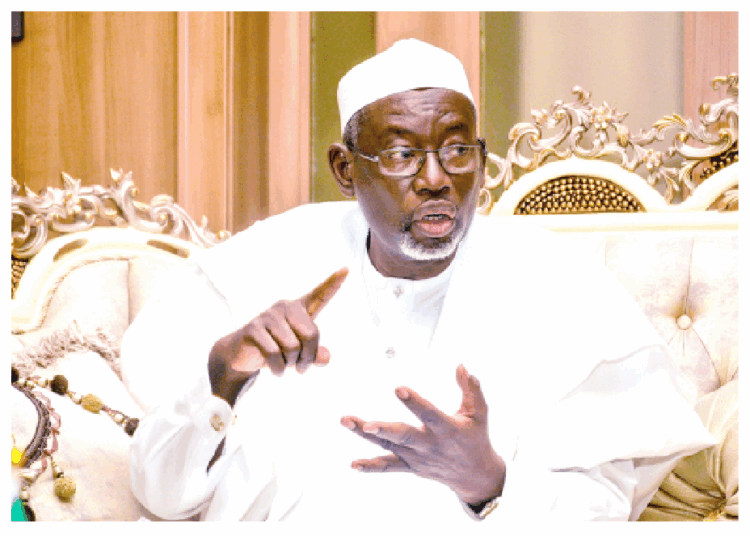Your Excellency, how would you assess the impact of President Bola Ahmed Tinubu’s two years in office on the lives of ordinary citizens in Jigawa State?
First of all, President Bola Ahmed Tinubu’s two years in office have been rewarding and promising, not only for the citizens of Jigawa State but for the nation as a whole.
I describe them as rewarding and promising because a good leader must be audacious in making bold decisions in the people’s interest, especially for long-term benefits.
In Nigeria, we need a transformation from traditional ways of doing things to discard outdated policies and replace them with better ones. Achieving this requires a strong and courageous leader who can drive such change.
We need a leader with the conviction to make decisions that may be misunderstood initially but ultimately benefit everyone.
This is precisely what has characterised President Bola Ahmed Tinubu’s administration over the past two years.
His decision to remove fuel subsidies and unify the exchange rate was a necessary step that should have been taken earlier. Yet, only he dared to implement them despite the challenges. I am confident that these measures have rescued Nigeria from drifting into another economic recession and a devastating crisis.
The outdated fuel subsidy programme did not benefit ordinary Nigerians; instead, middlemen profited at the expense of national economic stability, growth, and development.
Initially, the subsidy removal sparked controversy, protests, and economic hardships. However, the rationale behind it and its positive impact are now becoming evident.
At the federal level, revenue entering the federation account, shared among the federal, state, and local governments, has significantly increased. These funds benefit Jigawa State’s citizens at the grassroots level, as well as in other states and at the federal level.
The removal of fuel subsidies has provided more resources for the federal, state, and local governments to execute projects that improve citizens’ social and economic well-being.
For instance, in Jigawa, numerous contracts have been awarded, including the construction of over 47 roads. We have also completed 23 inherited road projects, renovated and upgraded more than 200 healthcare facilities (primary, secondary, and tertiary), recruited over 2,000 health workers, renovated and built hundreds of classrooms, supplied thousands of classroom furniture and other teaching materials, and recruited about 7,000 teachers.
Additionally, massive agricultural investments have positioned Jigawa as one of Nigeria’s leading states in wheat, rice, and sesame production. Water supply, commerce, and social welfare have also improved, all due to the increased resources from the fuel subsidy removal. These are the outcomes of this bold decision.
Secondly, the exchange rate unification has also helped stabilise our currency. Without currency stability, meaningful development is impossible. Today, everyone can attest to how this decision has strengthened the Naira, which continues to gain value daily.
Economic activities are picking up nationwide. The federal government’s policies on wheat, rice, and livestock production are expanding job opportunities, ensuring food security, and delivering other benefits, with Jigawa State’s citizens among the direct beneficiaries.
Therefore, I am confident that President Bola Ahmed Tinubu’s two years in office have been auspicious. I assure the people of Jigawa and all Nigerians that more benefits will come, and they will continue to thrive under his leadership.
The recent high-profile political defections have sparked widespread discussion. As a member of the APC, which has benefited the most from these defections, what is your take?
Naturally, no one will remain where they are uncomfortable or lack a secure future. If someone leaves their home for another, it means they have found a better one.
People are leaving their political parties to join the APC because they see hope, sincerity, and a guaranteed future for themselves and their children under President Tinubu’s leadership.
The transformations at the federal and state levels are positively impacting lives, which is why people are defecting to the APC—even to the extent that some state governors and entire party structures are switching allegiance. This reflects their trust in President Tinubu’s leadership.
Last week, you returned from an official trip to India with a powerful delegation from Jigawa State’s agricultural sector. Is there any good news for Jigawa’s citizens?
My trip to India was highly fruitful and rewarding. Jigawa is an agrarian state, so agricultural transformation is our top priority. If we do not revolutionise agriculture in Jigawa, we have achieved nothing, given that 75–85% of our population depends on farming as their primary livelihood.
In India, we sought partnerships with agricultural experts, investors, and seasoned farmers to enhance various aspects of agriculture in Jigawa. We focused on three key areas: dairy production, poultry farming, and seed production.
On Dairy Production:
We proactively discussed with stakeholders, including India’s National Dairy Development Board (NDDB). They demonstrated how they successfully developed India’s dairy sector, transitioning from a dairy-importing to a dairy-exporting nation.
There are so many lessons and ideas to learn from them in our quest to improve dairy production in Jigawa State. These included clustering livestock farmers and forming them into cooperatives from the political ward level to the local government, to the state and national levels.
The process will provide a comprehensive system of training livestock farmers in modern cattle rearing, providing them with access to quality animal feeds, veterinary services, artificial insemination of their cows, dairy uptakes, and processors and producers of dairy into various products.
This system made the Indian dairy production sector very attractive and profitable, improved dairy productivity, and led the country to migrate from a dairy-importing country to a dairy-exporting country.
We had a fruitful discussion with NDDB, a 60-year-old body. They agreed to partner with us in developing the Jigawa dairy production sector.
We also learned that in addition to national bodies, there is the private sector with similar mechanisms. The key is not making too much money but accepting a little profit to support grassroots farmers’ better lives and contribute to national food security, job creation, growth, and development.
We signed an agreement with two different investors, and they will soon come to Jigawa to help us form the structures, formulate policy, and establish the dairy processing plant.
Given the similarities in climate and rural demographics, replicating India’s model in Jigawa is feasible.
On Poultry Farming:
We discussed the major challenges militating against Jigawa poultry farmers, such as high feed costs, diseases, and low productivity.
Agreements were signed with investors who will come to Jigawa to help us in their areas:
- Improve poultry disease management.
- Deploy hatchery technology.
- Enhance biosecurity infrastructure.
- Train farmers and extension workers.
- Support research and development.
- Facilitate technical exchanges.
- Strengthen poultry cooperatives.
- Provide affordable, high-quality feed solutions.
On Seed Production:
Quality seeds are crucial for agricultural transformation. During our visit, we engaged with seed production companies and observed advancements in scientific research.
We discovered rice seeds yielding 10–12 tons per hectare, compared to our current 5 tons. If our farmers access such seeds, their profits and Nigeria’s food security will improve.
Agreements were signed for partnerships in seed development, processing, and distribution. Collaborations with Nigeria’s National Seed Development Agency are also underway.
Additionally, we attended an investment forum where we showcased Jigawa’s potential, attracting significant investor interest.





